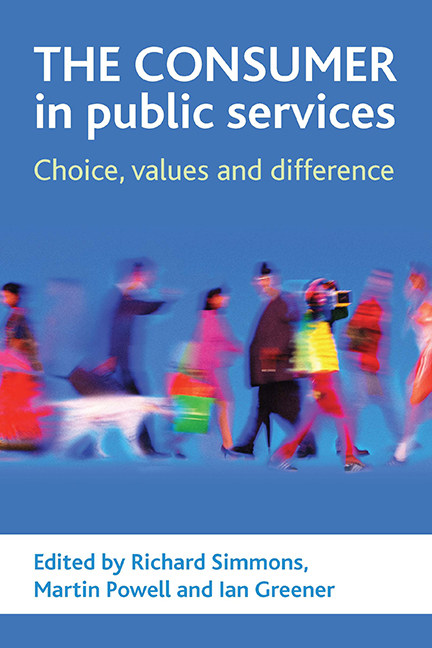Book contents
- Frontmatter
- Contents
- List of figures and tables
- Acknowledgements
- Notes on contributors
- Foreword
- one Introduction: managing the ‘unmanageable consumer’
- two The consumer and New Labour: the consumer as king?
- three Narratives of public service delivery in the UK: comparing central and local government
- four Understanding the ‘differentiated consumer’ in public services
- five Differentiating consumers in professional services: information, empowerment and the emergence of the fragmented consumer
- six The healthcare consumer
- seven The consumer in education
- eight The consumer and social housing
- nine The people’s police? Citizens, consumers and communities
- ten The consumer in social care
- eleven Differentiated consumers? A differentiated view from a service user perspective
- twelve Authoritative consumers or experts by experience? User groups in health and social care
- thirteen The public service consumer as member
- fourteen Conclusion: the consumer in public services
- Index
nine - The people’s police? Citizens, consumers and communities
Published online by Cambridge University Press: 22 January 2022
- Frontmatter
- Contents
- List of figures and tables
- Acknowledgements
- Notes on contributors
- Foreword
- one Introduction: managing the ‘unmanageable consumer’
- two The consumer and New Labour: the consumer as king?
- three Narratives of public service delivery in the UK: comparing central and local government
- four Understanding the ‘differentiated consumer’ in public services
- five Differentiating consumers in professional services: information, empowerment and the emergence of the fragmented consumer
- six The healthcare consumer
- seven The consumer in education
- eight The consumer and social housing
- nine The people’s police? Citizens, consumers and communities
- ten The consumer in social care
- eleven Differentiated consumers? A differentiated view from a service user perspective
- twelve Authoritative consumers or experts by experience? User groups in health and social care
- thirteen The public service consumer as member
- fourteen Conclusion: the consumer in public services
- Index
Summary
Introduction
Policing has an uncomfortable relationship to the dominant model of public service reform because of its relationship to law and the exercise of legal authority by police officers. The chapter draws on empirical work in two English urban settings to consider how both police and public view the usefulness of the ideas of consumers and customers. The idea of communities as a collective customer or user is then considered, raising some questions about how communities are to be discovered and engaged in the business of policing, with links to anxieties about local accountability in the recent Flanagan Report on the future of policing in England and Wales (2008). The chapter concludes by reflecting on the problematic relationship between publics, politics and power in policing.
Ideas of the consumer or customer emerged in debates about the future of policing during the late 1980s, reflecting pressures to modernise and managerialise the organisational structures and cultures of policing, culminating in the Sheehy Report of 1993. Sheehy attempted to install core principles of the New Public Management at the core of what proved to be a much-resisted and relatively unsuccessful programme of reform (Leishman et al, 1995). Police forces, notably the Metropolitan Police, were also seeking to improve their relationships with the public as various indicators suggested deepening levels of mistrust and antagonism between the police and at least some sections of the public (Heward, 1994). Especially in the case of the Met, this involved worsening relations with Afro-Caribbean sections of the London public, especially young black men. Questions of both canteen culture racism and what the Macpherson Inquiry (Secretary of State, 1999) into the Met's investigation of the murder of Stephen Lawrence was later to call institutional racism were issues of continuing concern.
In this period, the question of consumers and customers tended to focus on what might be described as front-line handling of citizen encounters, such that a greater focus was placed on customer care and customer satisfaction (Heward, 1994, pp 246–7). This immediately raises – in a sharper form than most other public services – questions about who is the consumer/customer of policing.
- Type
- Chapter
- Information
- The Consumer in Public ServicesChoice, Values and Difference, pp. 157 - 176Publisher: Bristol University PressPrint publication year: 2009
- 1
- Cited by

